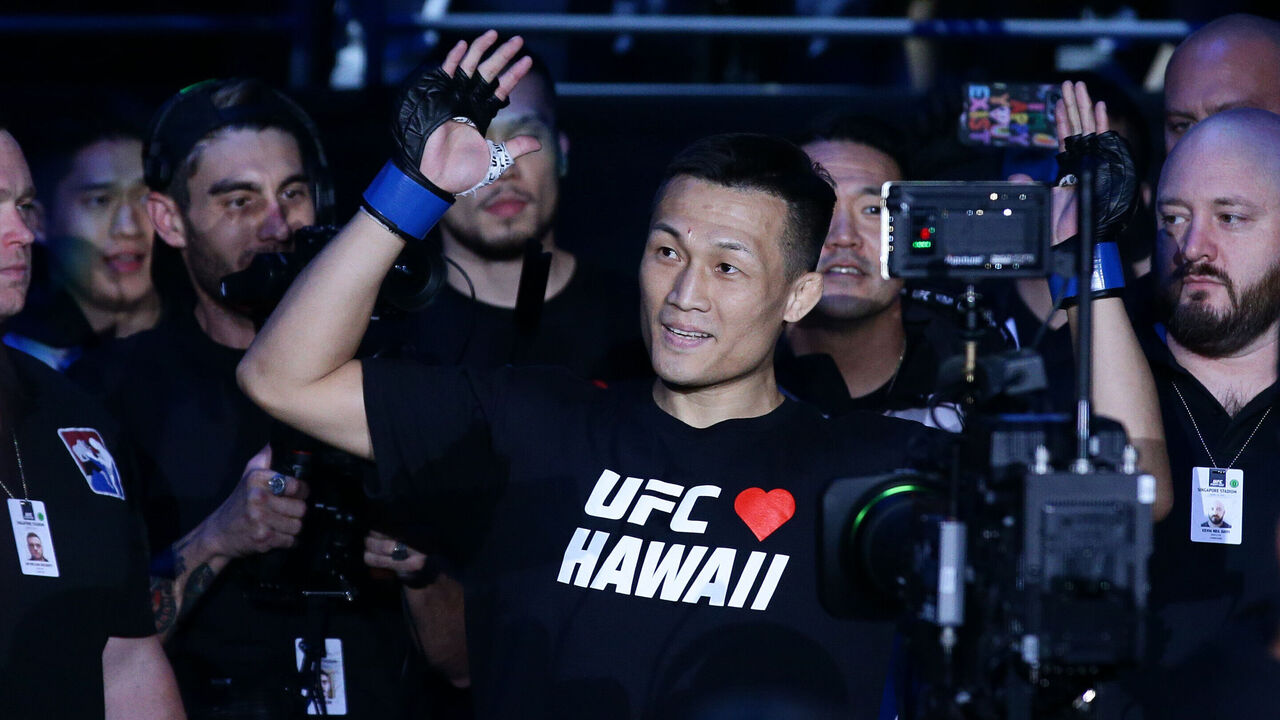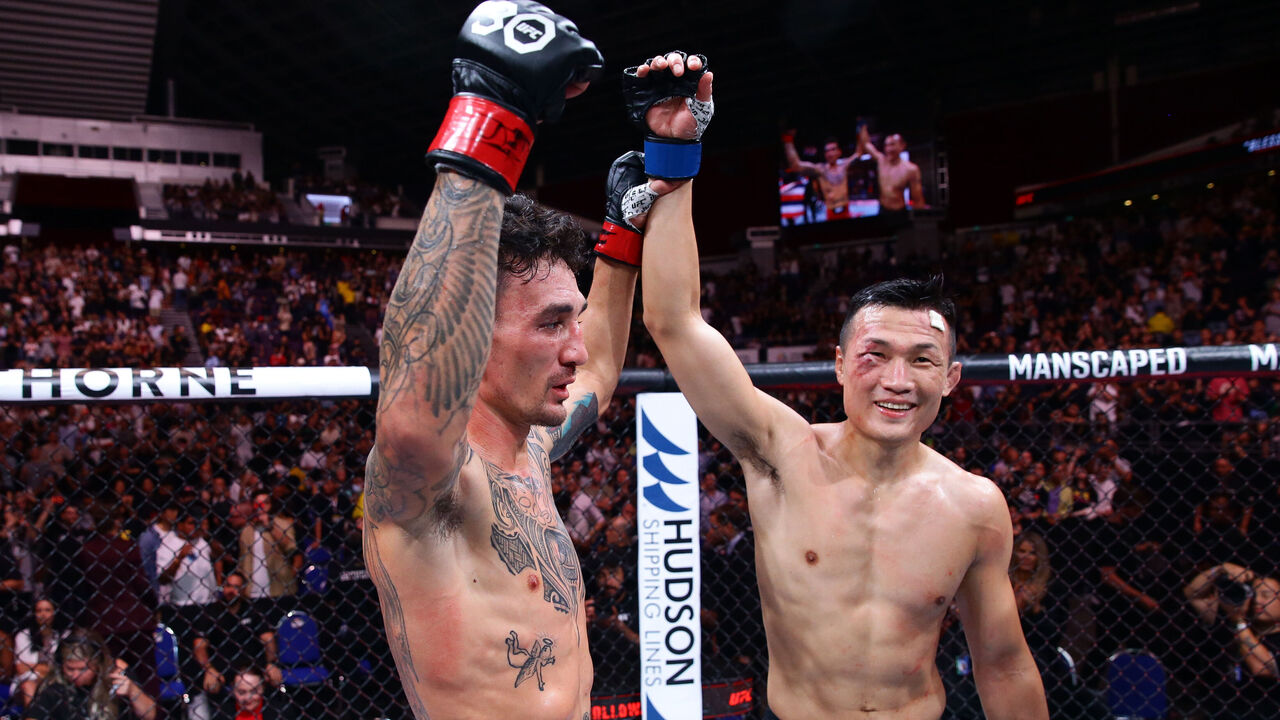'The Korean Zombie' was the best - without ever being the best
Chan Sung Jung ended his MMA career the only way "The Korean Zombie" was supposed to: biting down on his mouthpiece, carelessly marching forward, and going for broke.
His knockout loss to former UFC featherweight champion Max Holloway in Singapore on Saturday should've felt like another depressing MMA retirement. (This wasn't a publicly known retirement fight for Jung, but the R-word came up during fight week. There had been some signs.) After all, an aging veteran went up against one of the greatest featherweights of all time as a massive underdog and got flatlined.
Except it didn't feel that way at all. Sure, this wasn't Robbie Lawler snatching a body in a flawless swan song or Amanda Nunes riding off into the sunset with two UFC belts, but it wasn't Mauricio "Shogun" Rua getting finished by a nobody in Brazil, either. Although Jung came up short, there were more happy thoughts than sad ones after Holloway shut out the lights.
That's because Jung went out on his own terms, doing what he knows best: being an entertainer.
After Holloway badly hurt him in the second round, Jung seemingly decided before Round 3 that either he or Holloway would get knocked out - and soon. Jung walked Holloway down like a maniac, sacrificing any chance of a safe victory to give the fans one more highlight. Either he'd pick up a stunning upset win, or he'd go down swinging. In many ways, this was a self-inflicted knockout, almost like when Yair Rodriguez came back to finish Jung with just seconds left in their 2018 main-event bout.
Against Holloway, Jung wanted to go out in true "Zombie" fashion.
"He never, ever wanted to die on his shield - always on his sword," Holloway said postfight.
That's why MMA fans have a special kind of love for "The Korean Zombie."

Throughout 13 years under the Zuffa banner, the 36-year-old built a reputation as an all-time action fighter - and as an icon of the UFC featherweight division.
Jung was a relatively unknown prospect when he debuted with the WEC - the now-defunct MMA promotion purchased by the UFC's parent company - in 2010. But it didn't take him long to introduce himself to the wider MMA audience, delivering an instant classic against Leonard Garcia that's still talked about more than a decade later.
After transitioning to the UFC in 2011, Jung became known as one of the sport's most exciting fighters. In his first three Octagon appearances, he finished Garcia with the first twister submission in UFC history, knocked out Mark Hominick in seven seconds, and tapped Dustin Poirier with a D'Arce choke.
In a UFC career that spanned 12 fights, Jung had two opportunities to win the featherweight title - first against Jose Aldo in 2013, and then versus Alexander Volkanovski in 2022. Neither fight went well.
Perhaps things would've turned out differently had Jung not missed four years of his MMA career to complete South Korea's mandatory military service.
Either way, it's a moot point. Jung was never the top featherweight in the world, but he was right up there with the best for a long time. For a fighter whose career was essentially split into two different chapters - immediately re-establishing himself as a contender after four years away was very impressive - Jung did quite well for himself.
"I haven't achieved everything," Jung wrote on Instagram after his retirement, "but I've achieved enough."
Thanks to his fan-friendly offensive fight style and heartwarming personality outside the cage, "The Korean Zombie" will be remembered more fondly than many champion fighters.
Look at the response from his fellow competitors. Everyone from Conor McGregor to Henry Cejudo to former opponent Brian Ortega praised him on social media after the Holloway fight. A common theme was how much heart "The Korean Zombie" showed in his fights, and how great of a human being he is.
Make no mistake, Jung is your favorite fighter's favorite fighter.
Holloway, the last man to share the Octagon with him, posted an extra special tribute to Jung's career on social media.
"What an honor to share the Octagon with you," Holloway wrote. "The man, the myth, the legend. ... You are the last of a dying breed. Thank you for paving the way."

The UFC could always rely on Jung to put on a show. He headlined a remarkable 10 events - including two pay-per-view cards - in 12 fights. His first two UFC bouts were his only non-main events. And not one fight was a stinker.
Jung competed across several different markets, including the United States, Canada, the United Arab Emirates, his native South Korea, and, most recently, Singapore. He also headlined the UFC's 25th anniversary event against Rodriguez in 2018. And he put Korean MMA on the map. The impact Jung has had on the sport, even as someone who never wore a UFC belt, is massive.
After Jung took off his gloves and placed them on the canvas, signaling his retirement, the crowd serenaded him one last time. His legendary walkout song, "Zombie" by The Cranberries, flooded Singapore Indoor Stadium in the background. Everything about his retirement - from the walkout to the fight itself to the UFC's video tribute afterward - made for a strangely perfect moment.
All in all, this was a fitting end for "The Korean Zombie." He had a kill-or-be-killed mentality every time he stepped into the Octagon. That's why he was the best without ever being the best.